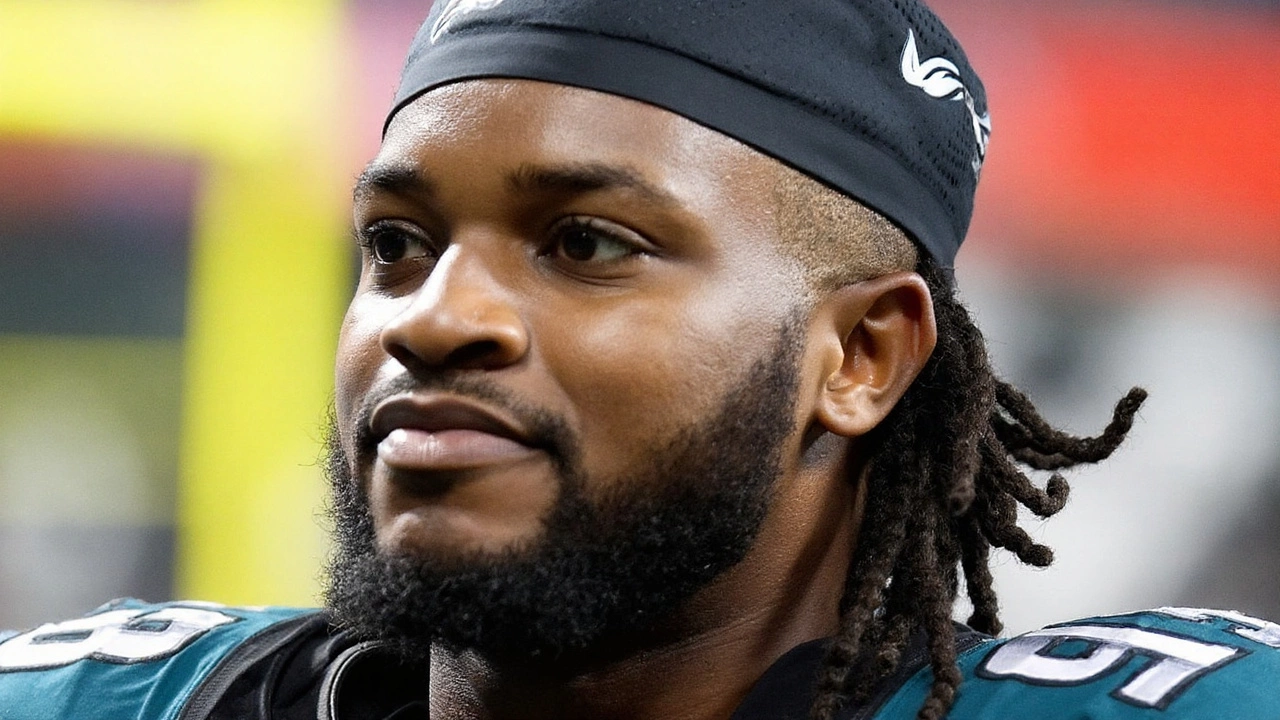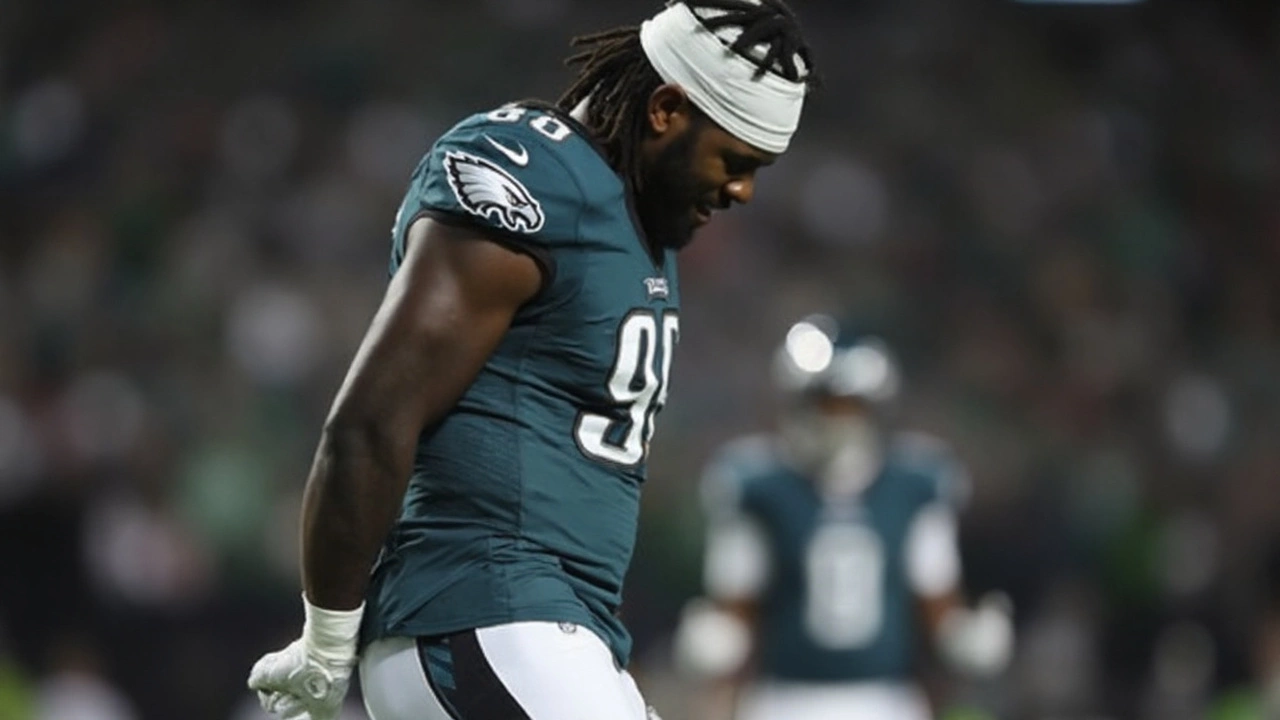Jalen Carter Ejected for Spitting on Dak Prescott in Eagles–Cowboys Opener
 Sep, 5 2025
Sep, 5 2025
A six-second flashpoint
The season opener between Philadelphia and Dallas barely had a heartbeat when it erupted into controversy. Jalen Carter, the Eagles’ disruptive defensive tackle, was ejected just six seconds in for spitting on Cowboys quarterback Dak Prescott during an injury timeout. Referee Shawn Smith told a pool reporter that an official witnessed the act and that it was a disqualifying, non-football foul. The flag stung twice—15 yards for unsportsmanlike conduct and the loss of one of the NFL’s most feared interior defenders before a snap was even played.
The sequence was bizarre. After the opening kickoff at Lincoln Financial Field, Eagles special teamer Ben VanSumeren stayed down and received extended medical attention. As both units came onto the field and the pause stretched, Carter approached Prescott near the Dallas huddle. Broadcast replays appeared to show the two jawing face-to-face before Carter spit on Prescott’s uniform. Prescott immediately signaled to an official. The flag flew, and Smith announced the ejection as boos rolled through the stadium.
The penalty flipped field position in an instant. Dallas used the short field to put together a six-play, 53-yard march, punching in a short rushing touchdown for a 7-0 lead. For a rivalry that rarely needs extra fuel, the mood turned volatile right away.
Spitting is treated as a flagrant act under the league’s unsportsmanlike conduct standards and can draw an automatic disqualification when seen by an official. “One of the officials observed him spitting on an opponent,” Smith said. “It’s a disqualifiable foul in the game. It’s a non-football act.” In other words, intent and context matter less here; if it’s seen, you’re gone.

Fallout for both teams
Philadelphia lost its interior anchor on the opening series, a gut punch for a defense built to win with pressure up the middle. The Eagles leaned on their rotation—bigger roles for Jordan Davis and Milton Williams—to stabilize the front. Defensive coordinator Vic Fangio, who praised Carter’s edge and burst earlier in the week, had to compress the plan on the fly, dialing up more line movement and selective blitz looks to create interior disruption without his best individual pocket-collapser.
The Cowboys grabbed early momentum, and Prescott looked unfazed after the incident, directing a quick, efficient scoring drive. Yet the night didn’t tilt all one way. Philadelphia settled in, matched Dallas physically at the line of scrimmage, and clawed back. The Eagles’ offense found a rhythm, the defense tightened in the fourth quarter, and Philadelphia closed out a 24-20 win—an outcome that doesn’t erase the ejection but does change the emotional tone in the building afterward.
For Carter, the football story and the disciplinary thread now run in parallel. The 2023 ninth overall pick out of Georgia arrived as an instant difference-maker, a Defensive Rookie of the Year finalist who turned double teams into a weekly feature. He’s the rare interior lineman who wrecks timing by himself. That’s why this one moment, early as it was, felt seismic: the Eagles built their front to run through him, and the locker room sees him as a core piece for the long haul.
The league will review the play as it does with all ejections. Discipline can range from a fine to a suspension, depending on the office’s read of intent, clarity of the video, and past precedent. Philadelphia can also take internal action, though teams usually wait for the league first. Because the ejection happened on national TV in the opening game, expect a swift look and a decision before the next kickoff week.
Inside the stadium, the crowd reaction cut both ways: boos for the call, then a low rumble of frustration as Carter walked off, helmet in hand. On the Dallas sideline, coaches corralled emotions and pushed the tempo, trying to stack a second score before the game settled. That it didn’t snowball from there is a credit to an Eagles defense that tightened its run fits and to an offense that controlled the middle of the field when it needed to.
There’s also the human side here. The flashpoint came during an injury timeout as medical staff tended to VanSumeren. It’s a strange and tense setting—quiet, still, then suddenly loud. The incident overshadowed concern for the special teamer’s status; the team hadn’t provided a detailed update before the final whistle. The visual—sidelines gathered, an injured player on the turf, and two stars jawing—will replay all week.
Rivalries create their own weather systems, and Eagles–Cowboys might have the league’s fastest-moving front. Emotions run hot. Still, there’s a line every player knows. Spitting crosses it. The officials made that clear, and the rulebook backed them. For Philadelphia, the bigger picture is whether this becomes a one-night storm or a lingering cloud over its defensive identity as the season stretches out.
- League review: The NFL’s football operations department will evaluate the ejection and issue any discipline, typically within the week.
- Possible appeal: If disciplined, Carter can appeal through the standard process, which can reduce fines or alter suspension length.
- Depth chart ripple: The Eagles’ interior rotation may expand if the league sidelines Carter, with more early-down work for Davis and Williams.
- Rivalry temperature: When these teams meet again, officiating crews will be on high alert for post-whistle contact and verbal sparring.
In a game decided by one score, the opening sequence did matter. It handed Dallas a runway and forced the Eagles to spend energy patching a plan on defense. But football games are long, and Thursday night proved it. Philadelphia found answers without its top tackle, Dallas found early success despite the distraction, and the season already has its first flashpoint everyone will be arguing about until the next one arrives.